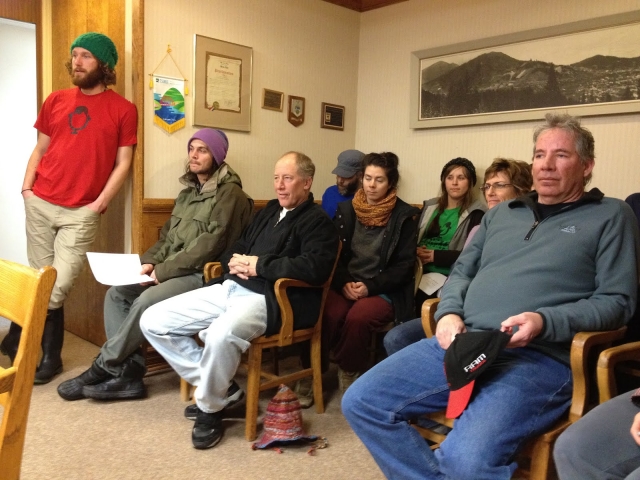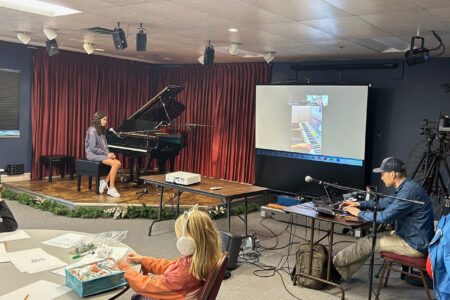Rossland’s 'voice in the wilderness' requests lower rent
Volunteers from 101.1 FM, Rossland Radio Co-op (RRC), crammed council chambers en masse on Monday evening to ask for “a little break” on the rent they pay the city to occupy 1807 Columbia Ave.
RRC representative Marty Cancilla said that the city-owned 1807 Columbia Ave. was “under-utilized” prior to the co-op moving in. Both the Food Bank and Search and Rescue occupy offices in the same building, but Cancilla noted that these groups do not pay the city rent. The RRC pays $220 per month, plus $40 for electricity.
Other costs include insurance, phone and internet, SOCAN tariffs (Society of Composers, Authors and Music Publishers of Canada), membership dues to the NCRA (National Campus and Community Radio Association), and building maintenance costs.
Cancilla argued that the radio coop “is an operation that is worth some subsidizing with tax dollars.” He pointed out that the volunteer community radio service is consistent with the Official Community Plan, encourages volunteerism, and strengthens the sense of community.
For comparison, he noted that Salmo grants their cooperative radio a space for $1 per year.
“We’re asking for your help,” he said. “We’re asking for a reduction in operating costs through rent reduction. We have found grant money and plan to continue to do so. But it’s difficult to find grant money for operations.”
“Unfortunately this is an operation, and operating costs add up, month by month,” Cancilla continued. “We continue to raise funds and pursue fundraising methods,” he said, such as T-shirt sales and helping to host the Joe Hill Coffeehouse, “but for all our efforts, the money we make is going to pay rent, telephone, insurance, licensing fees and other operating costs.”
As a “subsistence operation,” the RRC feel there is little time, energy, or money left over to improve their service with new equipment or recruiting new volunteers.
“Volunteers that sign up would like to work at a radio station and produce a radio show. They don’t want to spend all their volunteer hours hosting fundraising events only to see that cash used just to keep our head above water,” Cancilla said.
The RRC is writing grants and trying to raise funds to help purchase a new transmitter and repeater. This equipment would greatly expand RRC’s broadcast range, possibly as far as Trail and Castlegar. This would allow the RRC to approach new sponsors, attract new paying members, and bring in new revenues.
“We haven’t been able to hire anybody—another big cost we’ll be facing, that we would like to face,” he said.
Cancilla argued that some of the money saved on rent would be put back into 1807 Columbia through maintenance and renovations. RRC has made improvements to the property, such as painting the cabinetry and replacing some windows, doors, and parts of the floor.
Recently, for example, a leak in the roof was discovered. Although the cause of the leak is unknown, the repair bill totalling approximately “two months operation costs” has been sent to the co-op. The RRC wrote to the city, “The Radio Co-op accepts responsibility and apologizes for contributing to damage to city property but questions having to pay the entire cost.”
Cancilla gave a brief history of the RRC to illustrate how the group has been aided and abetted by friendly landlords in the past.
“We started as a small, grassroots, nonprofit cooperative on 2nd Avenue at the K2 contracting building, rent free” Cancilla recalled. “It was really beneficial for us to acquire new equipment and to spend time to recruit new volunteers.”
“K2 expanded and kicked us out, so we found a second home at United Church,” he continued. “We had a couple really nice rooms and paid a percentage of our quarterly operating costs. That was really beneficial to us as well, and we spent the money on equipment and renovations.”
Problems with easements, access, and regress forced the move to their current, third, location, for which the RRC said they are very grateful to the city.
“We’ve done a lot of things to contribute to this community,” Cancilla said. “It’s a well-recognized brand, and I think we can continue to do that.”
Whether council will hear our local “voice in the wilderness” remains to be seen as city staff prepare recommendations for council to debate in a subsequent meeting.
























